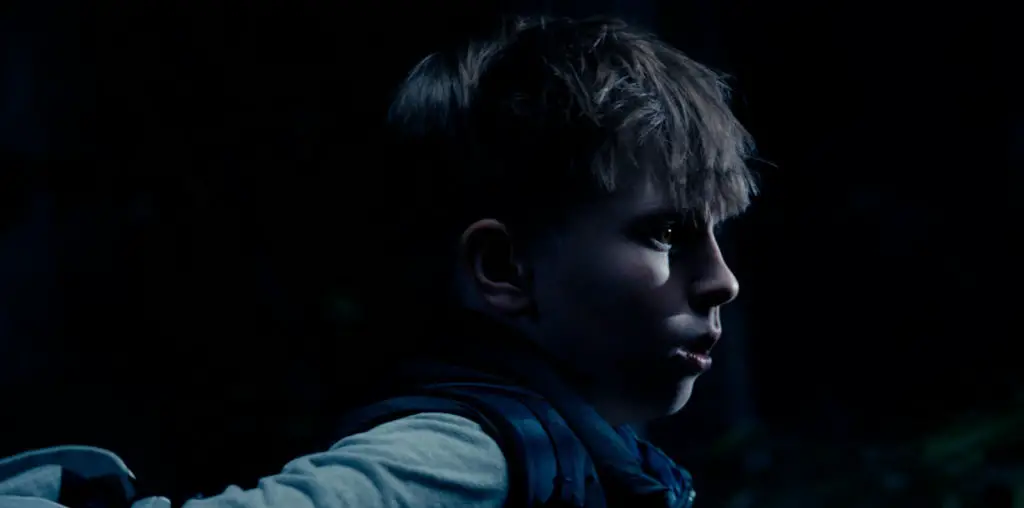
And he shall execute judgment and righteousness in the land. In those days shall Judah be saved, and Jerusalem shall dwell safely. — Jeremiah 33:15-16
Can there any good thing come out of Nazareth? — John 1:46
From fairy tales, on through the bulk of literature, and to TV and films, we get spoiled and expect non-plastic art-supposedly-mirroring-life to have its neat beginning, middle and ending. Whether the relationship is temporal-C follows B follows A, as on a calendar or in picaresque or road novels and films-or causal-A causes B causes C-the public has come to expect meaning, even though there may be diametric disagreement as to what that message says. For we speak of art, which theoretically brings order to the chaos of life. However innocent, each repetition of words or images is seized upon by critics with this or that interpretation to flog; even the most apparently disparate fates are interwoven, e.g., “War and Peace” or Altman’s “Nashville,” and lessons and reassurance neatly doled out.
What, then, is to be made of “Divine Intervention,” already opening in other countries and scheduled to premiere in the US in January? Palestinian writer-director-star Elia Suleiman does his homework, he insists, but then leaves script and preconceptions at home. Personally, he speaks of a tickle of inspiration, of tableaux within tableaux, of magic [and] poetic image that unexpectedly mix [when] you have to be totally sincere. Democratic is his word, non-political and for each spectator according to his own sensibility.
The wonderfully effective, funny and yet horrific film announces its bizarre take on things from the initial scene, in which a stumbling incongruous Santa Claus is chased up a cactus and cedar-covered hill overlooking Nazareth; the audience laughs as the present-laden fat man is cornered, until he turns to reveal a meat-cleaver stuck in his chest. (Does he die? Wheelchaired in a hospital, unjolly half-dressed Santa is later glimpsed in a throwaway, but this is a different actor: another of Suleiman’s anecdotes is that the original one turned out to have one lung and could not negotiate the climb.)
Using minimal dialogue, a handful of joyfully obscene monologues, and novice actors and non-actors whose characters have no regional, ethnic names but are everymen and -women-E.S. (the director himself), the Woman, the Jerusalem Neighbor, Soldier, Friend-Suleiman mortars together a surreal, moving mosaic of coincidence and non-sequitur. Like the two wordless friends who drink tea on a rooftop and watch mundane but outrageous behavior, we, too, observe, and in the end it all makes sense-not from mere repetition of scenes (often in threes) but because there is, again in the director’s words, a progression.
Coherence comes, not from the logic of the insanity of our world, but with the frightening, fascinating reality of dream. Reactions are wildly disproportionate: the overkilling of a son of a bitch (not at first shown to be a mere snake); the relishing description of road-rage beating occasioned by a parked car; bottles are thrown, a soccer ball suddenly and savagely knifed, a man calmly offers imported coffee after his house is firebombed then machine-gunned, with no explanation. A military checkpoint tower collapses to a sexy sunglassed woman’s clacking heels, a blindfolded prisoner is called out to direct a lost tourist; E.S. and the Woman sit for hours in his car and make erotic love merely touching hands; wheeling intravenous drips, patients hobble from hospital beds to smoke in corridors with doctors; there are no buses, but a man waits at a bus stop, and what appears a peachpit is casually tossed from a moving car-and spectacularly blows up an Israeli tank.
Characters show up, scenes reappear, characters reappear, and suddenly it holds together. There is an implied Tati-esque discrepancy between what men say and what they actually do- “Neighbors should respect one another,” intones the deadpan man caught out flinging garbage into another’s walled garden. Or words are ill-fitted to situations, too strong or else inadequate- “There’s a balloon trying to get through [a checkpoint]. Can we take [machine-gun] it down?” One single slow tear appears only when onions are sliced.
But silence does not mean that there are no words to be said; severely emotionless faces do not mean there are no emotions to be felt. A violent ninja-movie takeoff does not mean that real people are not displaced, suffering and dying in this Holy Land where a knife-wielding hejabd Palestinian woman is the billboard ad-target for shooting ranges.
The ironic title-Deity decidedly does not intervene-trails its subtitle, “A Chronicle of Love and Pain”; these two latter emotions indeed go hand in hand, although manâ’s state is such that he will not fully understand. While perhaps some will choose to see the film as pro-Palestinian, Suleiman actually manages to avoid what he terms such political baggage. As with pointillism, Impressionism, Lichtenstein/comic-book art, a complex mosaic, one must gather a certain distance, step back a pace or so. The separate parts and vignettes cohere, the grand picture emerges: this area of Earth, perhaps all of it, has descended to madness, logic cannot flow, the center does not hold. Worse, people-flesh-and-blood-suffer, in silence, in pain, uncomprehendingly. Yet somehow, in some mysterious miraculous manner, they survive.
“Divine Intervention” invests its men and women with a dignity and stoicism that even madness does not efface. With humor, sympathy and horror, the film reminds us that we have, despite it all, survived.
